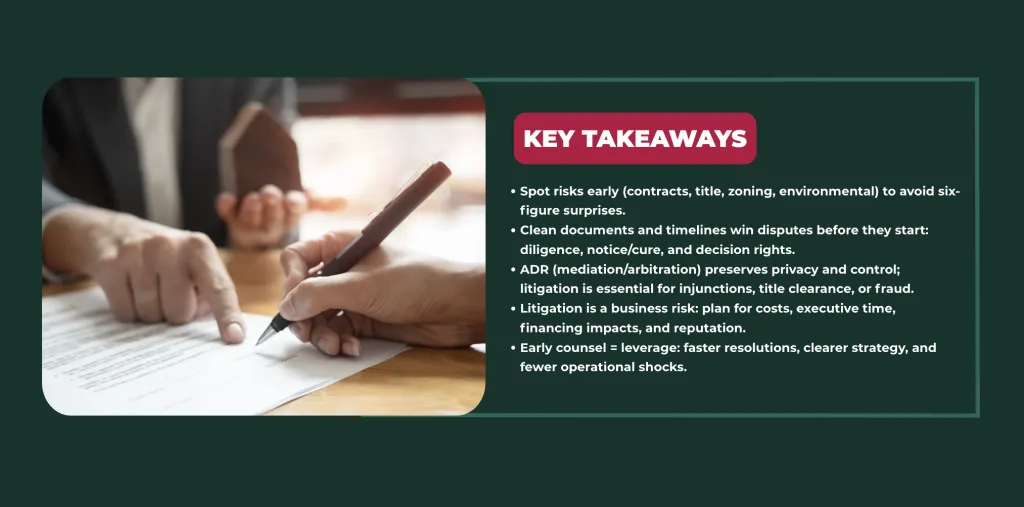Commercial property deals can feel like a high-wire act—one loose bolt and costs soar. When agreements sour, the path from handshake to courtroom can be fast, stressful, and expensive.
At ACE California Law, our mission is simple: protect your property, your peace of mind, and your future. Our real estate litigators combine courtroom experience with practical business judgment to steady that wire, reduce risk, and keep your project moving.
The Critical Importance of Anticipating Litigation Risks
Smart investors treat risk assessment as part of the deal—not an afterthought. Common tripwires:
- Contract gaps: vague repair duties, payment triggers, timing, or change-order rules.
- Title defects: hidden liens, missed easements, conflicting legal descriptions.
- Zoning clashes: uses that don’t fit local codes, missed variances/conditions.
- Environmental red flags: undisclosed contamination or incomplete reports.
Running disciplined diligence on these points costs far less than defending a multi-year lawsuit. When in doubt, have a California real estate attorney review the numbers, land records, and permit history before you sign.

The Role of Legal Counsel in Commercial Real Estate Conflicts
Even seasoned owners need a guide when conflict hits. Effective counsel will:
- Map remedies & timelines: injunctions, damages, quiet title, escrow relief, lien strategy.
- Coordinate the file: evidence, notices, experts, and insurer tenders through one point of contact.
- Navigate local practice: permitting boards and planning bodies have formal rules and informal customs—both matter to speed.
- Balance business + legal: protect leverage while keeping operations, tenants, and lenders steady.
Common Sources of Dispute in California CRE, and How to Respond
Contract Disputes
Missed escalations, late TI delivery, maintenance failures, or unmet milestones.
Response: audit the paper (lease + amendments + exhibits), enforce notice/cure windows, and quantify damages early.
Real Estate Fraud / Misrepresentation
Overstated condition, occupancy, or rent rolls; undisclosed defects or restrictions.
Response: preserve evidence, pull diligence files (Phase I, inspections, estoppels), and evaluate rescission vs. damages.
Co-Owner & JV Conflicts
Control rights, capital calls, exits, and valuation fights.
Response: enforce operating agreement mechanics (approval matrices, buy-sell, deadlock paths) and document defaults promptly.
Landlord-Tenant Issues
Rent defaults, unapproved alterations, holdovers, habitability/building-systems failures.
Response: strict compliance with notice requirements; interim access/repair protocols; targeted mediation for ongoing tenancies.
Boundary & Title Problems
Encroachments, bad surveys, old liens—often surfacing mid-buildout or pre-financing.
Response: title claims, boundary line agreements, corrective deeds, or quiet title to clear the path to closing.
Developer / Contractor Disagreements
Scope gaps, cost overruns, delay and defect claims.
Response: enforce change-order provisions, objective schedule updates, lien-waiver sequencing, and neutral inspections/punch-lists.
Legal & Regulatory Hurdles: Where Projects Get Stuck
| Stage | Primary Body | Common Pitfall |
|---|---|---|
| Land Acquisition | County Recorder / Title | Undisclosed liens, faulty legal descriptions |
| Planning & Zoning | City/County Planning & Zoning | Use variances denied; missed conditions |
| Environmental Review | State/Local Agencies | Late Phase I/II revealing hazards |
| Building Permits | Building Dept. | Missing structural/MEP sets; code gaps |
| Certificate of Occupancy | Building & Fire | Egress/signage/ADA deficiencies |
Each checkpoint is a dispute trigger. Early counsel coordinates applications, tracks deadlines, and—if needed—appeals adverse rulings before they halt progress.
The Financial and Strategic Burden of Litigation
- Direct costs: attorneys, experts, depositions, e-discovery, motion practice.
- Executive distraction: leaders pulled into strategy sessions, document holds, and testimony.
- Financing friction: lenders/investors may tighten terms, delay funding, or require case resolution.
- Reputation risk: market chatter can unsettle tenants, partners, and buyers.
Treat litigation as a business risk: build a response plan with legal, finance, and communications from day one.
Mediation & Arbitration: Faster, Quieter Paths to Resolution
Mediation (facilitated negotiation) preserves relationships and enables creative solutions.
Arbitration offers privacy and speed with a binding award—appeals are very limited.
| Factor | Mediation | Arbitration | Litigation |
|---|---|---|---|
| Speed | Fast | Moderate | Often long |
| Cost | Lower | Medium | Higher |
| Privacy | Private | Private | Public |
| Control | Parties decide | Arbitrator decides | Judge/jury decides |
| Best Use | Ongoing relationships | Technical/private disputes | Injunctions, title, fraud, precedent |
Pro tip: draft dispute clauses up front (mediation → binding arbitration), specify forum/rules, and cap discovery to control cost and time.
Why Early Resolution Often Wins
- Cost containment: stop fee burn before discovery and experts escalate.
- Clear the title: remove lis pendens/liens that block refinance, closing, or sale.
- Financial flexibility: unlock capital windows and rate cycles.
- Relationship equity: today’s “opponent” may be tomorrow’s tenant, lender, or GC.
- Data-driven choices: use decision trees (timelines, best/worst outcomes, ranges) to settle on business terms, not emotions.
FAQs
How do I know if I need an injunction?
If construction access, tenant operations, or asset control is at immediate risk, an injunction can maintain the status quo while the dispute is litigated.
We found an encroachment mid-financing—what now?
Engage title and survey teams immediately; pursue boundary agreements or quiet title. Don’t finalize loan docs until a curative path is locked.
Is arbitration always cheaper than court?
Not automatically. It’s usually faster and private; costs depend on how the clause handles discovery, experts, and timelines.
Can insurance help with construction defect claims?
Often—depending on policy language and endorsements. Tender early to all potentially responsible carriers and align contract indemnity with coverage.
What’s the quickest way to de-escalate a lease dispute?
Exchange reconciliations with backup, set a short mediation window, and agree to interim payments/repairs to stabilize operations while you negotiate.
Conclusion: Control the Dispute Protect the Deal
Commercial real estate litigation doesn’t have to derail your project. With the right plan—tight contracts, disciplined records, strategic ADR, and focused litigation when necessary you can contain risk and keep momentum.
If a dispute is brewing—or already here ACE California Law can help you assess exposure, choose the right forum, and drive to a practical resolution.
Call ACE California Law at (833) 342-2323 or visit our Contact Us page to schedule a consultation.
Protect your property. Protect your peace of mind. Protect your future.






